
International Grant Report: Malawi Endoscopy training visit report
Malawi Endoscopy training visit report 16th - 23rd November 2024
UK faculty: Dr Neil McDougall (Belfast) & Prof Adrian Stanley (Glasgow) Local Faculty: Lilongwe - Mr Chipilimo at Kamuzu Central Hospital (KCH) Local Faculty: Blantyre - Mr Anstead Kankwatira and Sister Rose Malamba at Queen Elizabeth Central Hospital (QECH) & Dr Alex Stockdale at Malawi- Liverpool- Welcome Trust
Aims
Hand over donated endoscopes and related equipment to KCH unit
Run a 2-day Foundation course in upper GI endoscopy at KCH endoscopy unit for trainees identified locally for basic endoscopy training.
Meet Dr Jonathan Ngoma, Hospital Director and Senior physician at KCH, Lilongwe regarding potential future BSG-led UK support for further upper GI Endoscopy and Hepatology training there.
Travel to Blantyre to run a 2-day Foundation course in upper GI endoscopy together with local trainer Mr Anstead Kankwatira, at the World Gastroenterology Organisation (WGO) regional training centre at QECH, for trainees identified locally for this training.
Hand over donated endoscopes and related equipment to the QECH team.
Run a 2- day Refresher/ Upskilling course with Mr Kankwatira at the WGO- QECH centre, for senior clinicians who were already providing the local endoscopic service and had asked for a Refresher course.
Help facilitate endoscopy nurse training at QECH, coordinated and led by Sister Rose Malamba, Senior nurse trainer there.
Meet the head of Medicine at QECH, Tamara Phiri, to discuss future potential BSG-led UK support for further upper GI Endoscopy and Hepatology training there
Lilongwe
After arriving in Lilongwe, we visited KCH and met the local Endoscopy team including Mr Chipilimo and the two senior local trainees who had both undertaken <5 endoscopies previously but had been identified by senior clinicians for Foundation endoscopy training at the unit. We spoke with them regarding their current work, resources and requirements and donated endoscopic equipment from Glasgow. They currently had 7 functioning endoscopes in the department.
Over the 2 days there, we ran a Foundation Endoscopy course using a mixture of short presentations, educational discussions and videos covering issues including indications, consent, complications, common findings and management. We then provided endoscopic training for the trainees on the existing KCH endoscopy model and showed and discussed relevant training videos. This was followed by closely supervised live cases for each delegate with local senior clinical input from Mr Chipilimo. Feedback was provided by us after each case.
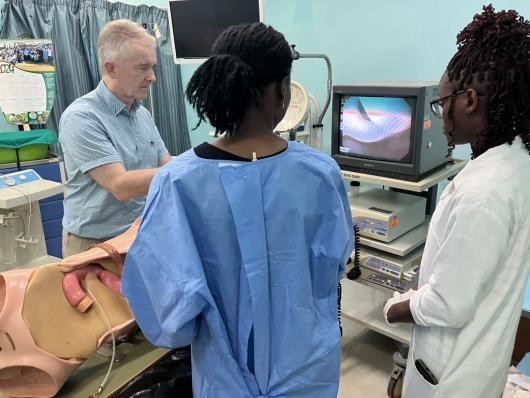

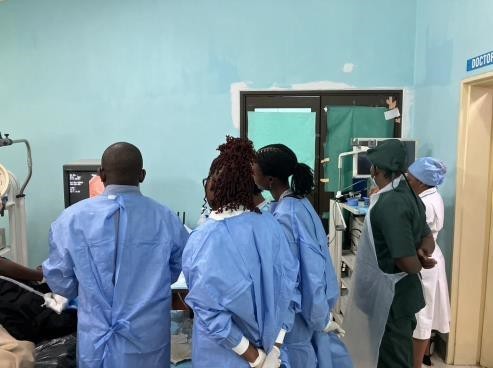
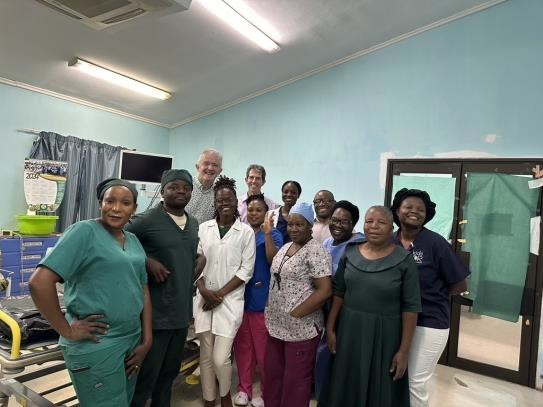
At the end of the course, we had a prearranged meeting with the Hospital Director, Dr Jonathan Ngoma (a Hepatologist) and we discussed further potential Endoscopic and Hepatology training at KCH. He indicated that the training to date was very helpful and he was very keen for further endoscopy training and help with running another Malawi Liver Conference in the future.
Blantyre
After travelling to Blantyre, we met the local faculty of Anstead, Rose and Alex and finalized plans for the Endoscopy courses to be run there. ie a Foundation course in endoscopy for 5 trainees from QECH and Zomba who had been identified for this by local senior clinicians, a Refresher/Upskilling endoscopy course for 3 existing endoscopists (2 from QECH and 1 from Zomba who had asked for this training, and parallel nurse training led by Sister Rose Malamba. We also handed over donated endoscopic equipment from Glasgow including two Gastroscopes.
For the Foundation course, similar to Lilongwe, we ran 2-days of theory, videos and discussions, model work and live cases with regular one-to one feedback to trainees. A simple endoscopy quiz was given to each trainee before, and after the course, and a formal WGO feedback form was also completed by each trainee at the end (see feedback results in appendix)
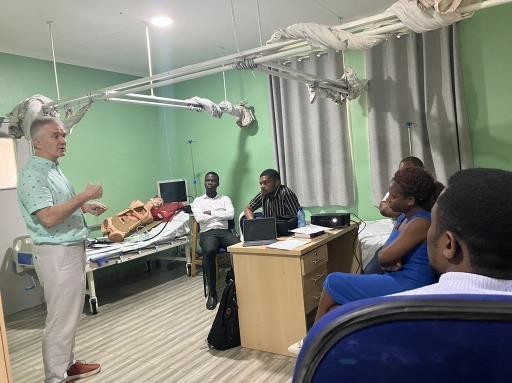

For the Upskilling course, we ran two days of hands-on training with two all-day lists that included patients with varices, ulcers, oesophageal cancer and gastric cancer. Fortunately, the Blantyre unit had just received a new “Euroligator”, a re- usable endoscopic banding device to treat varices (see photo below). Malawi adapted DOPS forms were also completed for each delegate (see appendix). At the end of the Upskilling course, a formal WGO feedback form was completed by each delegate (see appendix). We also had discussions with Dr Alex Stockdale and Tamara Phiri, Deputy Head of Medicine at QECH, regarding further endoscopy and Hepatology training support from BSG/UK, which she supported.
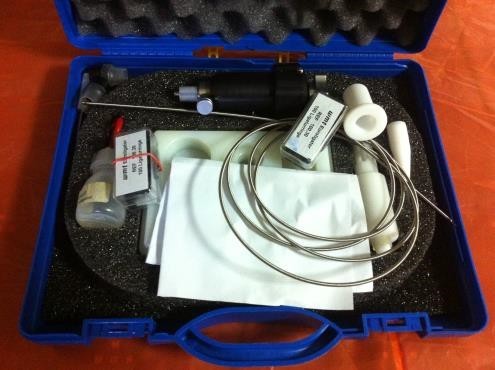
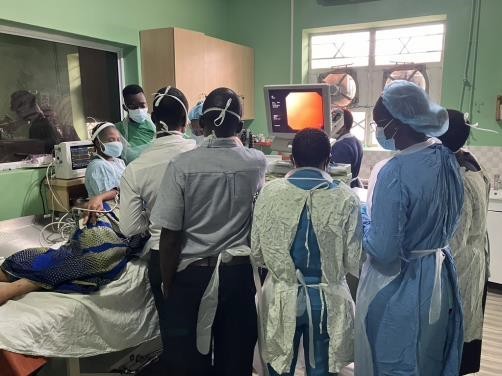
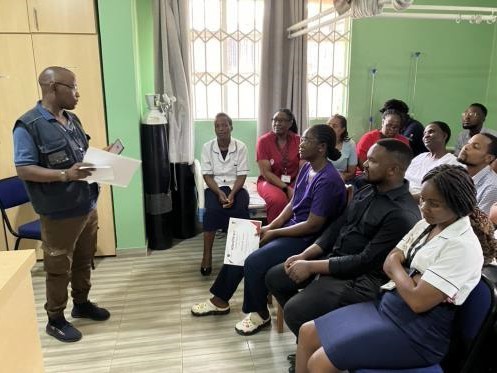
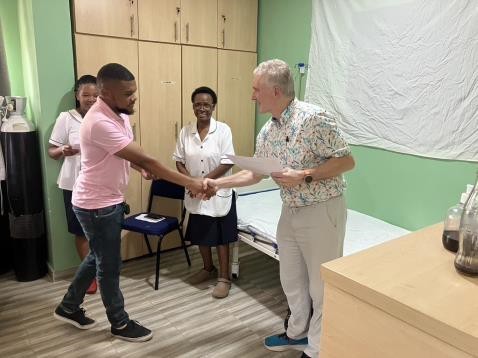
In both KCH and QECH, the nurses performed to a very high standard led by Senior nurses Khatsza and Bertha at KCH, and Sister Rose Malamba at QECH. All patients had the procedure fully explained and informed written consent obtained. Pre-procedure patient observations were completed, equipment checked and peri-procedural care was to a high standard. The endoscopes were cleaned, brushed, disinfected and stored appropriately as per previously provided and agreed protocols. In Blantyre, Sister Rose Malamba ran a parallel Nurse training course for 9 nurses during our Foundation and Upskilling courses. At a short ceremony at the end of the training visit, all attendees at each course were given a certificate of attendance.
Notes:
KCH and QECH are the two largest hospitals in Malawi and have had intermittent endoscopy training visits by UK trainers over the past 14 years
QECH was designated a W.G.O approved regional endoscopy training centre in 2014
Dr Gift Mulima (Lilongwe), Mr Anstead Kankwatira & Sister Rose Malawi have previously undertaken train- the-trainers courses run by BSG/UK trainers in Malawi
Variceal bleeding and (squamous) oesophageal cancer remain the two major pathologies relevant to endoscopy in Malawi. Therefore access to, and training in, the reusable Euroligator and oesophageal stents (often supplied by Chinese donors) seem logical, together with ongoing equipment support
There have been three Malawi Liver Conferences to date, focusing on Education, public health, and the Malawi national strategy on viral hepatitis, with talks, discussions and action points on all aspects of liver disease. Clinicians, researchers, hospital managers and Politicians have been involved in these Conferences, which the BSG has supported.
Acknowledgements:
BSG for funding this visit from an international grant
Greater Glasgow & Clyde Health Board for donating four endoscopes & related accessories and their ongoing support for this training in Malawi
WGO and MLW for their support in running these courses
Dr Alex Stockdale for coordinating most of the travel and accommodation required for this training visit
AJS & N McD Nov. 2024
(see appendices below)
Appendices
Malawi adapted DOPS form:

Endoscopist: Date: Trainer: Dr A. Stanley
Scale:
4 - Highly skilled performance
3 - Competent & safe throughout procedure, no uncorrected errors
2 - Some standards not yet met, aspects to be improved, some errors uncorrected
1 - Accepted standards not yet met, frequent errors uncorrected N/A - Not applicable
Criteria | Score | Comments |
Assessment, Consent, Communication
|
|
|
| ||
| ||
Safety & sedation
|
|
|
| ||
| ||
Endoscopic Skills during insertion & withdrawal
|
|
|
| ||
| ||
| ||
| ||
| ||
| ||
| ||
Diagnostic & Therapeutic Ability
|
|
|
| ||
| ||
| ||
|
Case difficulty
Extremely easy | Fairly easy | Average | Fairly difficult | Very challenging |
|
|
|
|
|
WHO endoscopy training feedback results – Blantyre Foundation course (n=5):
Course objectives clearly stated: all 5 said yes. Course slides & handouts useful: all 5 said yes.
Course relevant to their practice: 4 said very relevant & 1 somewhat relevant Effectiveness of instructors: all said excellent or good.
Instructors knowledgeable & experienced: all 5 said yes.
Did instructors encourage questions & discussion: all 5 said yes Quality of models: 2 said excellent, 2 good & 1 fair.
Overall satisfaction: 1 excellent, 2 fair, 1 good.
Would you recommend course to others: all 5 said yes.
Free text comments all suggested a longer course and/or more live cases. Note all 5 trainees scored higher in the post course vs the pre course quiz
WHO endoscopy training feedback results – Blantyre Upskilling course: (n=3)
Theory, mini lectures & hands-on cases with DOPS Objectives clearly stated: all 3 said yes
Slides useful: all 3 said yes
Relevance of course: all 3 said very relevant Effectiveness of instructors: all 3 said excellent
Were instructors knowledgeable & experienced: all 3 said yes Encouraged questions & discussion: all 3 said yes
Hands on training sufficient: all 3 said yes
Did it improve your confidence in Endoscopy: all 3 said yes Satisfaction with course: all 3 said excellent
Would you recommend to others: all 3 said yes

Rwanda International Grant Report 2025
Rwanda Endoscopy Training Visit (26–28 August 2025)

International MENA region - Colon cancer screening
Colorectal cancer (CRC) is a significant public health issue, representing one of the greatest causes of both cancer diagnosis and mortality globally. While the incidence is highest in high-income countries, it is rising across the world, including in the Middle East and North Africa (MENA) region.
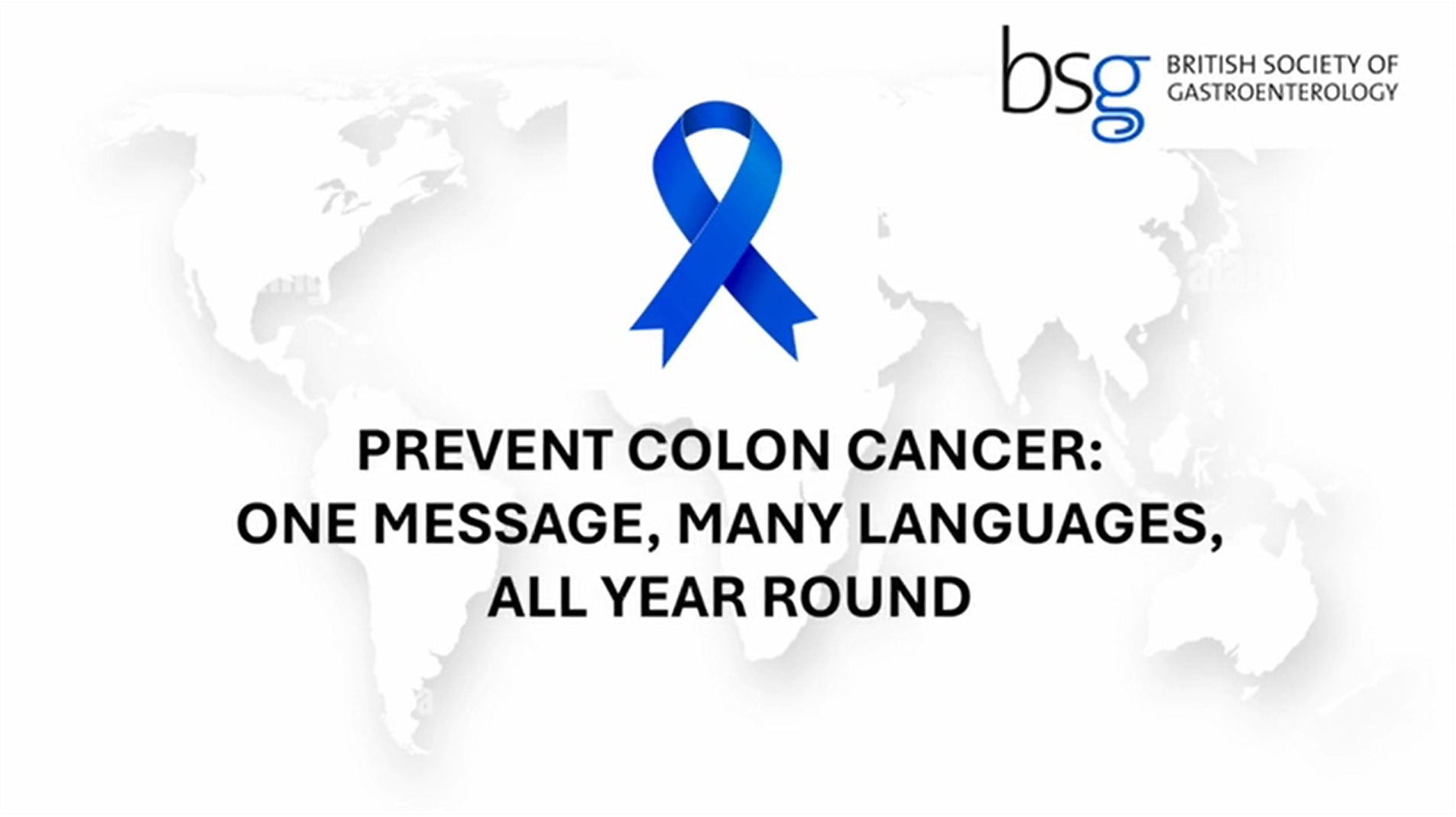
BSG International: Colon Cancer Screening Awareness
The BSG International Section is proud to raise awareness about colorectal cancer through a multilingual video featuring our members from around the world. Early detection saves lives—let’s spread the message far and wide!